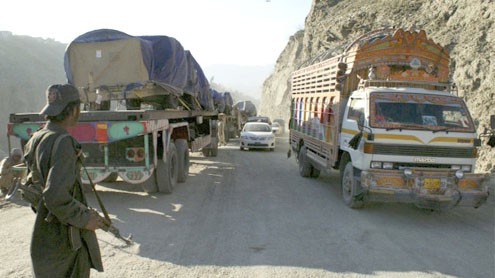 With the public’s simmering resentment against the US having boiled over at the third major US transgression within the space of a year, the first two being the Raymond Davis and Osama bin Laden affairs, ‘business as usual’ indeed ought not to remain the flavour of the month.
With the public’s simmering resentment against the US having boiled over at the third major US transgression within the space of a year, the first two being the Raymond Davis and Osama bin Laden affairs, ‘business as usual’ indeed ought not to remain the flavour of the month.
The tough line taken by Prime Minister Gilani is not only a response to the indignation and humiliation felt throughout the country over the Salalah incident, but also points towards a nuanced but potentially fundamental shift in the relationship of the two countries going forward. Public outrage continues to manifest itself in anti-US protests, and in hysterical reactions from some quarters of the media as well as the political class. It would be a mistake, however, to assume that the US alone is the reason for, or target of, the widespread anger and humiliation on display across the political and social spectrums.
With a deepening realisation of the impotence of the Pakistan government and military in the face of repeated bullyboy tactics and humiliating breaches of sovereignty on the part of the US, people’s wrath is equally targeted at its own government. The manifest impotence in protecting even its own troops from repeated massacres by an ‘ally’ adds, quite justifiably, insult to injury.However, Pakistan’s geo-strategic location and the logistical imperatives that arise from it for the US, its long standing involvement in Afghanistan and the perceived sway it holds with the Afghan Taliban, and its ‘cooperation’ in the war on terror, form the basis of its indispensability for the US. And the latest incident is now being perceived to have strengthened the country’s bargaining power with the US vis-à-vis the war on terror and the Afghan endgame.
With marching orders for the US from Shamsi base, blockage of NATO supplies into Afghanistan, and the announced reevaluation of all aspects of the relationship, Pakistan is already turning the screws and demonstrating an upper hand. President Zardari’s flat refusal of the UAE’s request to reconsider the Shamsi base eviction, Pakistan’s immediate contacts with China and Russia over the issue and those countries’ ensuing supportive statements, and Pakistan’s furious demands for a thorough investigation and admission of culpability further indicate that this time a mere apology will not suffice. Concessions, at least in the terms of engagement being redefined and a larger role in the Afghan endgame being milked from this episode, may very well be on the cards.
As for the incident itself, it remains mired in controversy with both sides adamantly sticking to their versions into the fourth day post-attack. What is clear, however, is that the military posts were targeted intentionally. What is not clear is why they were targeted, and why, if Pakistan army’s claim of remaining under fire for two hours, neither was the attack by NATO halted earlier even after ‘pleas’ by the Pakistan army, nor any air power on the part of Pakistan was scrambled to confront the attack. These are key questions that will need to be, and must be, clearly addressed in the forthcoming investigations.
Therefore, whilst emotions are running high, awaiting the outcome of the investigation is vital before any major decisions are taken. Cooler heads must prevail in the face of immature calls for quitting the war on terror. The war, at least in this country, is not of our choosing to walk away from. The state and the people are under attack by extremists and terrorists who clearly covet overrunning the entire country. Like it or not, the stakes for Pakistan are as high, if not higher, than for the US and will require serious statecraft, not puerile and unrealistic demands to ‘get out of the war’. These very stakes may necessitate an ongoing relationship with the US, albeit an altered one. – Dailytimes











